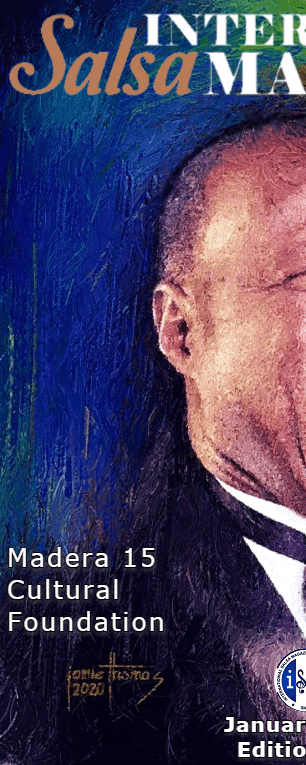Latin America / Venezuela / Carabobo
Jesús Federico Betancourt was born in the city of Valencia, Carabobo state, on March 22, 1940. He was always attracted to music from a very young age.

In his adolescence, he liked Cuban rhythms, being influenced by Sonora Matancera, Mon Rivera, Eddie Palmieri and Joe Cotto. Before entering the entertainment world, he works at the Bank of Venezuela.
He affirms that he has not carried out formal studies at the musical level, learning the necessary theory to be able to perform as an orchestra conductor, but without interest in interpreting any instrument, but with a well-tuned ear, which has allowed him to remain in the music business for decades. , in fact on certain occasions he is named as the King of the Güiro.

His career began when he entered the Los Selectos Orchestra, where they played songs by the Billos Caracas Boy’s and the Los Melodicos Orchestra, which were at their peak in the 1960s, all this in a particular way, said Orchestra did not go beyond that.
In 1965, Federico Betancourt decides to satisfy his artistic restlessness and founds a band called Federico y su Combo Latino. The members that made up this band were chosen from among the founder and together with Roberto Monserrat.
But it was not until the middle of 1966, when the twenty-six (26) year old undertook the recording of the LP that would make him famous forever. This record production entitled LLEGO LA SALSA, would mark an important stage in Venezuelan Salsa, because it was the first LP that made use of the word SALSA in the country.

Federico Betancourt himself recounts that the Venezuelan announcer Phidias Danilo Escalona had a Radio Program called LA HORA DE LA SALSA, EL SABOR Y EL BEMBÉ, where all the Cuban and Puerto Rican Caribbean rhythms that were fashionable at the time were placed, among those who highlighted La Sonora Matancera with Celia Cruz, Tito Puente, Joe Cuba, Tito Rodríguez among others, and who was the one who supported them the most in terms of recording the album.
The production was recorded under the Palacio label, and the LP was titled LLEGÓ LA SALSA, he affirms that the title was chosen without taking into account the importance that it would revert in the future, he also affirms that it was not the name that gave him success , the album was a “bump” in sales, since all the songs were the most requested at the time, using his words: “The album sold like hot cakes”.
The music lovers of the time requested it on specialized sites such as the LA SALSA album. Federico says: “The father of the word SALSA was Phidias Danilo Escalona, he used it for the first time in his radio program, and I, humbly, with the success of my LP, gave him the push for its mass use.”

In Venezuela, the word SALSA was welcomed by the public willingly, since it suggested a mixture of flavors, which was exactly what happened in the Phidias program, but at the level of rhythms. After the appearance of Federico’s album, all the shows that were performed at the level of Caribbean and Cuban rhythms, carried the name of SALSA.
It is important to name the musicians who took part in this historic production: The musicians are: Ali Rojas Bongo and Cencerro, Roberto Monserrat Music Director and Timbal, Pedro Medina Congas, Alfredo Arcas Trombone, César Pinto Trumpet, Enrique Iriarte Piano, Rafael Prado Bass, Carlín Rodríguez Singer and maracas, Dimas Pedroza Singer, Federico Betancourt Güiro and Director of the Orchestra. The musical arrangements were by the famous trumpeter Eduvigis Carrillo (RIP). Production themes:
|
|
1.- Cocolía
2.- Conmigo 4.- Sancocho Caliente 6.- Celosa |
7.- Despierta Rumbero
8.- No Critiquen 10.- Baila Yemaya 12.- Que Me Querías |
After the success obtained with the record work, the time came for the first international outing, which was to Colombia, in 1969. It happened because the singer of Los Melodicos, Víctor Piñero, informed Betancourt that he was stuck in Cartagena and Barranquilla with the themes El Cobrador and Federico Boogaloo. After the information, the young musician went to the neighboring country and got a contract for the famous Reina del Mar parties, in Cartagena, on November 11, 1969.
The experience of the band was so good, that in 1970 they returned to visit the country. From then until our days Federico y su Combo continues to be an emblematic and legendary band in Venezuela, for this reason the WEB of the classy salsero SALSA BRAVA, offers its respects to such an important salsa figure.
| Discography | ||
| 1966 | Llegó La Salsa | Palacio (LPS-6171) |
| 1966 | Salsa y Sabor | Palacio (LPS-6185) |
| 1967 | Más Salsa | Palacio (LPS-6205) |
| 1967 | Durísimo – Vol. 4 | Palacio (LPS-6216) |
| 1968 | Federico Boogaloo | Palacio (LPS-6228) |
| 1968 | Psicodélico Con Salsa | Gilmar (LPG-110) |
| 1969 | Mejor Que Nunca | Gilmar (LPG-111) |
| 1969 | Vibración y Ritmo | Sonus (102-17080) |
| 1970 | Dos Sets | Velvet (LPV-1539) |
| 1970 | La Machaca | Velvet (LPV-1539) |
| 1973 | Federico Si Te Pone A Bailar | Palacio (LPS-6332) |
| 1975 | Derrape De Salsa | BASF (10.068) |
| 1976 | Siguelo Ahí…. a Lo Cortico | BASF (10.070) |
| 1977 | Ayer y Hoy | BASF (10.076) |
| 1977 | Esto Es Lo Mejor | Palacio (LPS-6372) |
| 1978 | Mis Exitos y Más | BASF (10.079) |
| 1978 | Sabor | Foca (LPF-10.037) |
| 1979 | Federico y Su Combo | Foca (LPF-10.120) |
| 1979 | Federico y Su Orq. – El Maestro | Discomoda (DCM-1128) |
| 1980 | Federico y Su Orq. con Memo Morales | Discomoda (DCM-1148) |
| 1982 | No Le Digan | Integra (PF-14.075) |
| 1983 | Nuevamente | Palacio (LPS-66.541) |
| 1984 | SaaaBroooSo! | Palacio (LPS-66.552) |
| Compilation | ||
| 1996 | Mis Exitos y Más…Vol.1 | Sonograma |
| 1996 | Mis Exitos y Más…Vol.2 | Sonograma |
| 1996 | Mis Exitos y Más…Vol.3 | Sonograma |
| 2005 | El Pionero De La Salsa | Palacio |
| 2008 | Salsa De Oro | Gilmar |

























